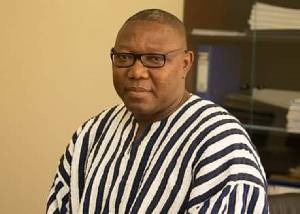Government owes WAEC GH¢22 million - Dr. Apaak.
Member of Parliament for Builsa South Dr. Clement Apaak has suggested that the 2022 calendar for the 2022 BECE and WASSCE would be affected because the government has started the West African Examination Council of the needed resources for the two examinations.
The MP says the government has not released any money to the WAEC for them to prepare for the examinations for final year students in the Junior High Schools and Senior High Schools, respectively.
He disclosed that WAEC needs not less than GH¢90 million to prepare for the organization of the examinations.
What made the situation worse, he added, was that the government is owing WAEC GH¢24 million for the organization of the 2021 BECE and 2021 WASSCE.
He wants the government to release the needed resources so WAEC will prepare adequately for the exams.
"As we speak, WAEC needs a minimum of GH¢90 million to prepare for the 2022 BECE and WASSCE. Those monies have not been released. So there is the possibility that WAEC’s calender could be disrupted. So we want to use this opportunity to call on the government to do the needful. Pay WAEC the GH¢23 million arrears for WASSCE and BECE of 2021 and make the GH¢96 million available to WAEC to prepare adequately so that our young men and women who are looking forward to writing their terminal exams at the JHS level and SHS level would not be disappointed.”
read also: Ghana's foreign reserves dip to US$3bn from US$9bn - Finance Committee report.
Ghana's foreign reserves have propped by a third, from US$9 billion to US$3 billion, a recent report by Parliament's Finance Committee shows.
The document buttresses the dire state of the country’s finances as the government continued engagements with the International Monetary Fund, IMF, for an economic rescue programme.
The report disclosed that but for recent parliamentary approval of a US$750 loan agreement between the government of Ghana and the AfreximBank, the country would have hit bankruptcy.
“These challenges are further exacerbated by the rapidly dwindling reserves of the Bank of Ghana which have declined from $9 billion to about $3 billion. With a monthly demand of over $600 million, the reserves of the central bank may be exhausted in a few months if urgent steps are not taken to shore up the country's reserves.”
The committee report already before the House and subsequently adopted saw Finance Minister Ken Ofori-Atta, explaining to MPs the urgent need for the loan to shore up the reserve position of the Central Bank.
“The Minister further indicated that there is an urgent need for the government to secure the $750 million facility to help shore up the reserve position of the Bank of Ghana to avoid the country defaulting on its international commitments and also to avoid the country moving into insolvency.”
Ghana’s economic headaches
In recent months, Ghana has been faced with rather difficult economic challenges which have left almost all economic indicators in distress.
The country, in spite of some gains made during the COVID-19 pandemic, is facing a huge debt burden, revenue generation constraints and other factors which have placed the economy in a dire situation.
Recent developments around the globe, coupled with supply chain disruptions, the fallout from the pandemic and Russia’s invasion of Ukraine have made the situation even direr.
Meanwhile, the government of Ghana is targeting about US$3 billion from the International Monetary Fund under an economic support programme.
This was contained in a document released by the Ministry of Finance spelling out some details of the government's engagement with officials from the Bretton Woods institution in July.
The ministry explained that it seeks to secure the fund under a recently introduced innovative blended programme from the IMF dubbed; High Combined Credit Exposure (HCCE) policy.



No comments yet
Be the first to share your thoughts!